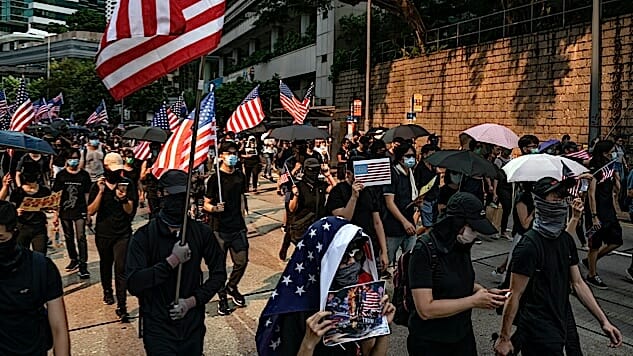Hong Kong’s Push for Democracy Shines a Telling Light on America’s Moral Priorities
Photo by Anthony Kwan/Getty
On Sunday, thousands of protesters took part in what began as a relatively peaceful protest, with participants—including families with children—marching from Causeway Bay to government offices in Admiralty, calling on the government to respond to the movement’s four remaining demands. The march was unauthorized and executed in direct defiance of a police ban, however, so it didn’t take long for it to disintegrate into violence, with radical protesters throwing bricks and Molotov cocktails at the police. In retaliation, the police fired back with tear gas and rubber bullets, using a water cannon to spray protesters with blue dye laced with tear gas to both mark and mar dissenters. Sunday marked the 15th consecutive weekend of anti-government protests in Hong Kong.
Notably, a substantial number of protesters Sunday were seen waving U.S. flags and singing the “Star Spangled Banner” in a direct appeal to the United States to use its power and influence to enact change. Some protesters called for President Trump to “liberate Hong Kong,” according to NBC News. And just last week, protesters made headlines when they called off protests Wednesday to show their solidarity in remembrance of Sept. 11. All this to say that Hong Kong’s ongoing protests and push for democracy are indelibly tied to the U.S., and the protesters’ plea to America to involve itself in the conflict is exposing the U.S.’s complicated moral obligations to democracy in a very revealing way.
Senator Marco Rubio (R-FL), who is champing at the bit to pass the Hong Kong Human Rights and Democracy Act through Congress, told The Atlantic that the protesters’ appeal to the United States is a reminder of how America is still a “symbol of democracy and freedom” to citizens around the world. “[The protesters] see a country where people vehemently disagree on public policy and say horrible things about each other, but no one goes to jail for it,” he said. (In Hong Kong, at least 1,300 people have been arrested since the protests broke out in June.)
But while this is true in principle, in practice, it is less so. Just this past weekend, 76 protesters were arrested in NYC after they staged a peaceful sit-in at the Microsoft store on Fifth Avenue to demand that the tech company stop lending its technology to ICE. Last week, protesters were arrested for staging a protest against the Senate’s confirmation of Trump’s “ethnonationalist” judicial nominee Steve Menashi, who has been outspoken about his distaste for laws furthering the rights of women, the LGBTQ community, and minorities. And remember Brett Kavanaugh? Or any number of Black Lives Matter protests? Or President Trump’s inauguration day protests? All of these examples represent people “vehemently” disagreeing on public policy; all of these examples resulted in dozens if not hundreds of people landing in jail.
-

-

-

-

-

-

-

-

-

-

-

-

-

-

-

-

-

-

-

-

-

-

-

-

-

-

-

-

-

-

-

-

-

-

-

-

-

-

-

-








































